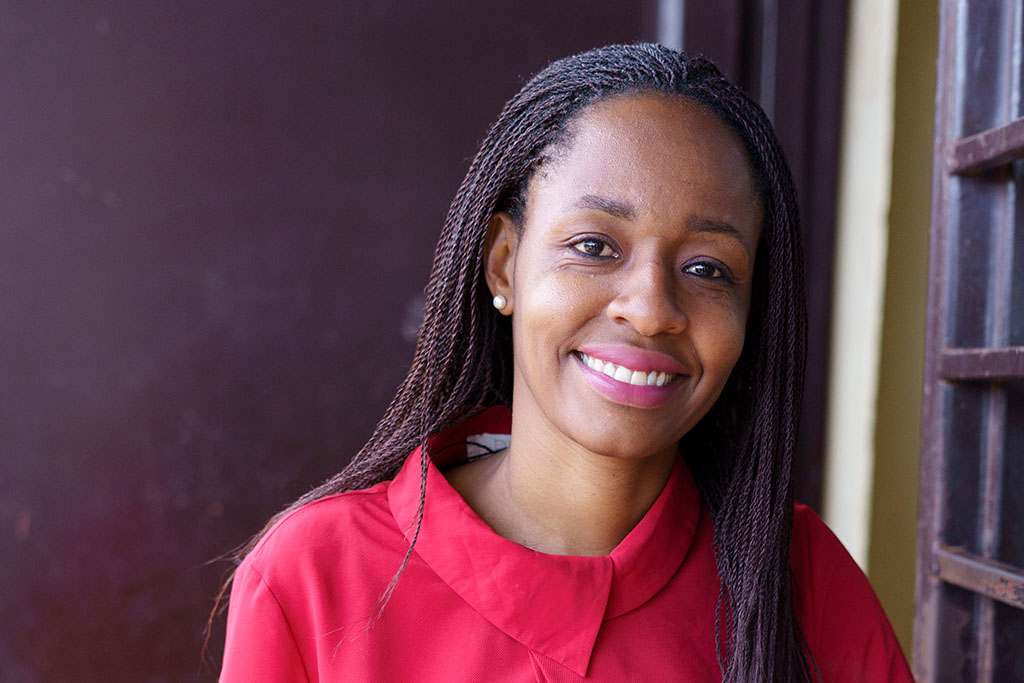Transforming gender norms in Rwanda: ”We are breaking the cycle slowly but surely”
At Paper Crown Rwanda, Clementine Nyirarukundo and her colleagues work tirelessly to fight gender inequality and transform deep-rooted social norms in Rwanda. By implementing a unique training programme and engaging young people, they want to break the cycle of violence.

Transforming gender norms, educating young people their sexual and reproductive health and rights, and equipping girls with knowledge and skills to resist violence—that is what Paper Crown Rwanda set out to do with their project ‘My Voice, My Power’. Founded in 2014, the organisation works with young people to transform gender norms at the community level. Today, they are amongst The Kvinna till Kvinna Foundation’s local partner organisations.
“Our main vision is to transform gender norms because we believe they are the root causes of all gender inequality,” says Clementine Nyirarukundo, who works as Programs and Partnership Manager at Paper Crown. “And we do believe that if harmful social norms are the root cause of gender inequality, then we need to transform these norms to create social lasting impact.”
Implementing a unique training model in Rwanda
As programme and partnership manager, Clementine works to make sure the projects and programmes by the organisation align with their overarching vision and values. She leads the development of partner relationships, as well as the implementation and evaluation of programmes.
‘My Voice, My Power’ is one such programme. Over the course of six months, it aims to educate and train young girls and boys on gender equality, violence against women, as well as sexual and reproductive health and rights.
The first of its kind in Rwanda, ‘My Voice, My Power’ includes a unique component: Girl Empowerment Self Defence (GESD), a part of the curriculum that is tailored specifically towards adolescent girls. Here, girls are equipped with knowledge and hands-on skills to help them resist violence. This including techniques such as assertiveness, verbalisation, de-escalation, and physical self-defence. Teaching girls how to use their voice and what they can do to safely exit unsafe situations is always a priority within the training.
“We do believe that girls are not responsible for the violence they face. But because social norms take longer to change, in the meantime, girls have the right to have the skills, tools and knowledge to be able to navigate violence,” says Clementine.
“Women are not encouraged to speak up”
While the training does include physical safe-defence techniques, one of its key components is teaching girls how to set and verbalise their boundaries—for example by saying “no”.
“This fits well with our context in Rwanda, where women are not encouraged to speak up for their right or to express their opinion,” says Clementine. “If you look at the harmful social norms that girls are conditioned to believe from a young age, including me and all women growing up in a Rwandan setting, we are not encouraged to use our voice.”
Additionally, the training focuses on informing girls about violence prevention. This includes learning about patterns of violence, being able to recognise them, and knowing what to do in unsafe situations.
So far, Clementine and her colleagues have been extremely pleased with the results of the programme.
“I wish I’d had [this training] when I was younger”, says Clementine. “Because it’s so important and valuable to know you have a voice. Even if you have policies that protect you—the moment you don’t believe that [you have these rights], and you can’t voice that, there’s no use.”
Including men and boys in the conversation
While the self-defence training is exclusively for adolescent girls, much of the organisation’s work—including other components of ‘My Voice, My Power’—are designed for both girls and boys. For Paper Crown, engaging men and boys is a key aspect of transforming deep-rooted norms that cause gender-based violence and discrimination.
“We do believe that gender equality is not an issue for women or girls. We believe it’s a community issue. And as much as we want to empower girls, we also want to help young boys realise the effect of gender inequality and violence,” says Clementine.
Therefore, educating young people—both girls and boys—is a key aspect of Paper Crown’s work to create sustainable change. This includes fostering youth leadership and community activism amongst young people, for example by encouraging them to share the knowledge they’ve acquired with their peers.
“We mainly work with young people because they are at a critical age where they are internalising what they believe, how they see themselves. If they are equipped with the right information, we are breaking the cycle through them. They are going to grow into a generation that has a different way of thinking,” says Clementine.
“The more we raise our voice, the more change happens”
The most rewarding aspect about her work, says Clementine, is witnessing the change and gradual empowerment in those who participate in Paper Crown’s programmes.
“From the moment when I first meet them, where they can’t look me in the eye and are whispering when they talk—to when they’re empowered and feel like they can use their voice,” she says. “We are breaking the cycle slowly but surely.”
‘My Voice, My Power’ was first implemented as a pilot project in 2020. Since 2021, it has been funded with support from Kvinna till Kvinna—a partnership that has been important for the work Paper Crown does, says Clementine.
“To have a partner that is dedicated, who wants to help, has pushed us one step closer to where we want to be,” she says. “Beyond the funding, it’s also a great help for us to network with other organisations, especially organisations that work with women. To brainstorm, share best practices, and put our voices together. The more we raise our voice, the more change happens.”